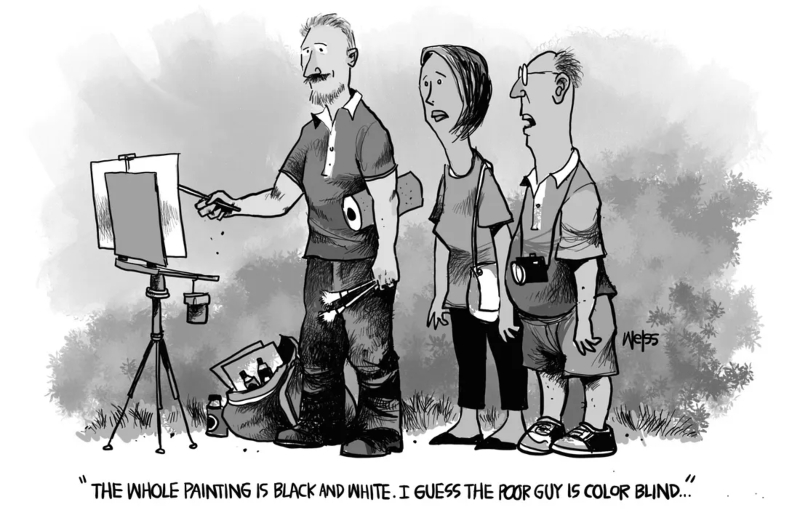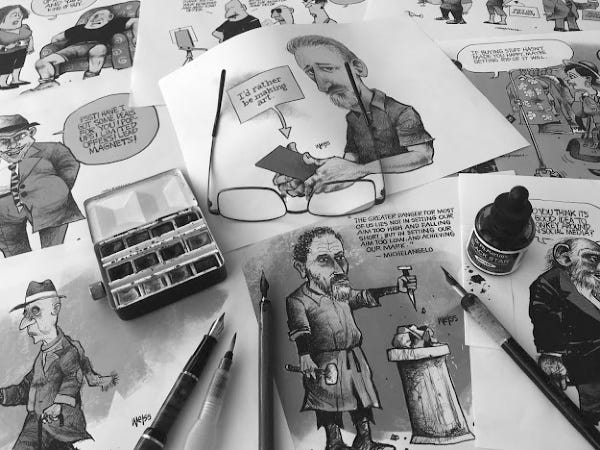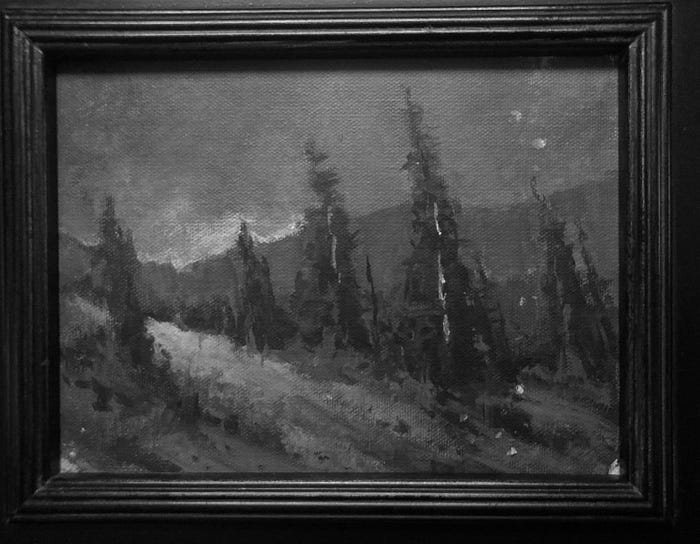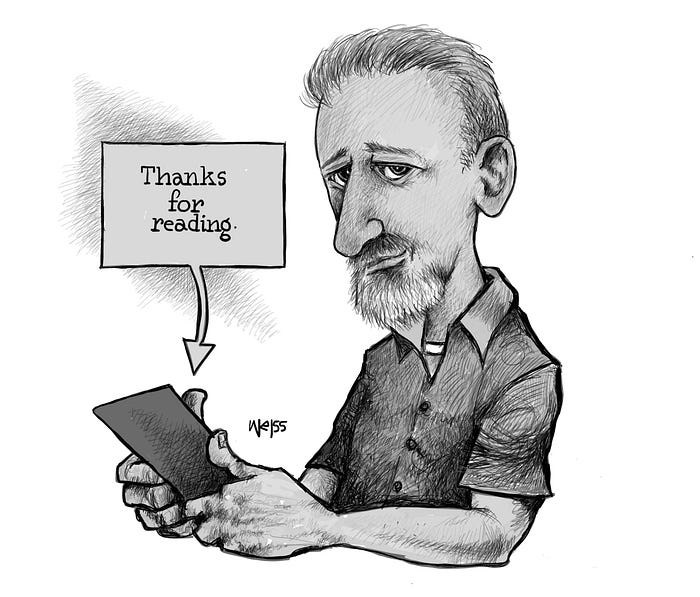
What do you do when you fall in love with something that brings enormous joy but possibly at the expense of your financial well-being?
Let me explain.

Before long I discovered monochromatic photographers like the late Henri Cartier-Bresson and Vivian Maier, as well as contemporary shooters like João Cabral and Phil Penman.
In black and white there are more colors than color photography because you are not blocked by any colors so you can use your experiences, your knowledge, and your fantasy, to put colors into black and white. — Anders Petersen
Soon, my taste in monochromatic photography extended to fine art as well. I was drawn to artists like Robert Kelley and Charlie Hunter. I evolved from color to black and white in my own artwork.

Monochromatic landscape by John Patrick Weiss
My cartoons changed, too. Where once I employed bright colors, now I craft whimsical cartoons in black and white.
The sketchy black and white cartoons hearken back to those old editorial cartoons I used to love in newspapers. Cartoonists back then seemed to draw with more attention to detail.
The elimination of color makes me focus more on my cross-hatching, shading, and detail in my cartoons. It takes longer now to finish a piece, but I like the weight and look of the final image better. I think using color made me artistically lazy.

Miscellaneous ink wash cartoons on my desk
It has all been great fun, but at a cost. Not everyone is into black and white imagery. In fact, most probably prefer color.
A few followers of my work have written to say that they miss the color. Some of my social media followers and newsletter subscribers have fled.
But, I have also gained some new followers who share my love of black and white imagery. So perhaps the jury is still out?
How about you? Have you made a change in the way you work? Have you embraced an aesthetic or creative approach that makes your heart sing, but others don’t like the music?
For hobbyists, there’s little consequence to chasing your personal aesthetic. But what if your income, or even your livelihood, depends on sales?
This is the classic struggle, and many creatives refer to it as “selling out.” Doing work for the money rather than the heart. Creating work that’s currently popular or for a client rather than your own artistic vision.
Withheld honesty results in forgotten words
I get it, we all have to make a living.
I retired early from my last career to become a full-time artist and writer. But I have the safety net of a good pension and medical benefits, so I can afford to stay true to my creative heart (although it’s still disappointing to lose followers and collectors when you make a creative change).

Moody, monochromatic landscape by John Patrick Weiss
Full-time creatives, whose families and livelihood depend on their income, risk a great deal to follow their artistic vision. So many swallow hard and craft work that the market demands and clients insist upon.
An artist has to eat, after all.
Being a prophet in the wilderness speaking truth to power typically leads to poverty and punishment. It is far easier to follow the lucrative trade winds of popular opinion but withheld honesty results in forgotten words. — Stewart Stafford
I see this frequently with online writing. Aspiring writers orient their content based on algorithms, clickbait, and whatever attracts “likes.” And there’s a legion of gurus to sell you hacks and other manipulations to “grow your audience.”
This is fine if your end game is simply to make money. But if the work you’re doing doesn’t reflect your true creative passion, then it won’t fulfill you. And if you don’t make room for more authentic work, you’ll have regrets later in life.
We define ourselves by our actions
In a speech at Kenyon College, Calvin & Hobbes cartoonist Bill Watterson said the following:
Selling out is usually more a matter of buying in. Sell out, and you’re really buying into someone else’s system of values, rules, and rewards.
Watterson famously refused to license his comic strip characters, much to the chagrin of his syndicate. But he knew that his cartooning was about saying things, not selling things.
In his speech, Watterson went on to note:
You will find your own ethical dilemmas in all parts of your lives, both personal and professional. We all have different desires and needs, but if we don’t discover what we want from ourselves and what we stand for, we will live passively and unfulfilled. Sooner or later, we are all asked to compromise ourselves and the things we care about. We define ourselves by our actions. With each decision, we tell ourselves and the world who we are. Think about what you want out of this life, and recognize that there are many kinds of success.
I suspect at some point I’ll return to using color in my photography and artwork. But either way, staying true to my creative vision (and not selling out) has brought me three joys.
First, there’s true passion in my work. I wake up in the morning anxious to start creating in my studio. The passion is a reflection of internal contentment because the work I’m doing aligns with my vision.
The second joy is growth. When you follow your creative passion, you don’t mind putting in the hard work of learning and practicing, because doing so brings you closer to your creative vision.
The third joy is blissful presence. When I’m working on my monochromatic artwork and photography, time stands still. I get lost in the moment. Some people refer to this as flow.
It’s much easier to slip into a state of flow doing something you love versus something you don’t love.
To invent your own life’s meaning
You’ll get no judgment from me if you have to sell out sometimes to support your family. Just make sure the work is lawful and ethical.
Many creatives learn the art of juggling. They do less inspiring work to pay the bills but carve out personal time to pursue their deepest creative passions. Sometimes, down the road, they can switch to pursuing their artistic vision full-time (that’s what I did).
Be wary of chasing algorithms or popularity online. Ask yourself if the creative work you’re sharing online will stand the test of time. Is it work that people would enjoy twenty years from now? Does it have depth? Or is it just shallow clickbait?
Consider the following wisdom from Bill Watterson’s speech at Kenyon College:
Creating a life that reflects your values and satisfies your soul is a rare achievement. In a culture that relentlessly promotes avarice and excess as the good life, a person happy doing his own work is usually considered an eccentric, if not a subversive. Ambition is only understood if it’s to rise to the top of some imaginary ladder of success. Someone who takes an undemanding job because it affords him the time to pursue other interests and activities is considered a flake. A person who abandons a career in order to stay home and raise children is considered not to be living up to his potential — as if a job title and salary are the sole measure of human worth.
You’ll be told in a hundred ways, some subtle and some not, to keep climbing, and never be satisfied with where you are, who you are, and what you’re doing. There are a million ways to sell yourself out, and I guarantee you’ll hear about them.
To invent your own life’s meaning is not easy, but it’s still allowed, and I think you’ll be happier for the trouble.
Try your best to stay true to your creative path. Learn to embrace the three joys of not selling out.
In the end, the world longs for authenticity, not the ephemeral tastes of algorithms and superficial appetites of the masses.
Keep refining your craft. Keep studying, growing, and investing in your creative vision.
Give the world your heart, soul, and poetry. It’s the only way to find true joy and happiness in your creative work.
Before you go
I’m John P. Weiss. I draw cartoons, paint, shoot black & white photography, and write elegant essays about life. To follow along, join my popular Saturday Newsletter here.
—
This post was previously published on Medium.
***
You Might Also Like These From The Good Men Project
 Compliments Men Want to Hear More Often Compliments Men Want to Hear More Often |
 Relationships Aren’t Easy, But They’re Worth It Relationships Aren’t Easy, But They’re Worth It |
 The One Thing Men Want More Than Sex The One Thing Men Want More Than Sex |
 ..A Man’s Kiss Tells You Everything ..A Man’s Kiss Tells You Everything |
Join The Good Men Project as a Premium Member today.
All Premium Members get to view The Good Men Project with NO ADS.
A $50 annual membership gives you an all access pass. You can be a part of every call, group, class and community.
A $25 annual membership gives you access to one class, one Social Interest group and our online communities.
A $12 annual membership gives you access to our Friday calls with the publisher, our online community.
Register New Account
Need more info? A complete list of benefits is here.
—
Cartoon by John P. Weiss

